- Home
- Robin McKinley
Shadows
Shadows Read online
Also by Robin McKinley
Pegasus
Chalice
Dragonhaven
Sunshine
Spindle’s End
Rose Daughter
Deerskin
The Outlaws of Sherwood
The Hero and the Crown
The Blue Sword
Beauty
Short story collections:
Fire: Tales of Elemental Spirits (with Peter Dickinson)
Water: Tales of Elemental Spirits (with Peter Dickinson)
A Knot in the Grain and Other Stories
The Door in the Hedge
NANCY PAULSEN BOOKS
An imprint of Penguin Young Readers Group
Published by The Penguin Group
Penguin Group (USA) Inc., 375 Hudson Street, New York, NY 10014, USA
USA | Canada | UK | Ireland | Australia | New Zealand | India | South Africa | China
Penguin Books Ltd, Registered Offices: 80 Strand, London WC2R 0RL, England
For more information about the Penguin Group, visit penguin.com
Copyright © 2013 by Robin McKinley.
All rights reserved. No part of this book may be reproduced, scanned or distributed in any printed or electronic form without permission in writing from the publisher. Nancy Paulsen Books, Reg. U.S. Pat. & Tm. Off. Please do not participate in or encourage piracy of copyrighted materials in violation of the author’s rights. Purchase only authorized editions.
Library of Congress Cataloging-in-Publication Data is available upon request.
Published simultaneously in Canada.
ISBN 978-0-698-13537-6
The publisher does not have any control over and does not assume any responsibility for author or third-party websites or their content.
Contents
Also by Robin McKinley
Title Page
Copyright
Dedication
CHAPTER 1
CHAPTER 2
CHAPTER 3
CHAPTER 4
CHAPTER 5
CHAPTER 6
CHAPTER 7
CHAPTER 8
CHAPTER 9
CHAPTER 10
CHAPTER 11
CHAPTER 12
CHAPTER 13
CHAPTER 14
to Diana Wynne Jones
CHAPTER 1
THE STORY STARTS LIKE SOMETHING OUT OF A fairy tale: I hated my stepfather.
It’s usually stepmothers in fairy tales. Well, equal time for stepfathers.
I almost don’t know why I hated Val so much. He was short and hairy and didn’t know how to wear Newworld clothes and spoke with a funny accent and used a lot of really dreeping words that nobody in Newworld had used in two hundred years. Have you ever heard anyone say “ablutions”? I didn’t think so. He looked like the kind of creepazoid you’d cross the street to avoid walking past too close to. And this guy who looks like a homeless crazydumb who’s about to start shouting about the evil magician who planted electrodes in his brain stands there smiling gently at my mother . . . and she laughs and puts her arm through his because she loves him. Uggh.
Maybe I hated him because she loved him, although I was pretty old for that kind of doolally. I’d turned seventeen by the time they got together, and my brother, Ran (short for Randal not Randolph), who wasn’t quite thirteen yet, thought he was wonderful. I don’t know what went wrong with me. It was like an evil magician had put electrodes in my brain.
Margaret Alastrina (everyone calls me Maggie, but the full lineup is way more effective if you want to shout), there’s no point in telling this story if you’re not going to be honest. Okay, okay, I do know why I couldn’t deal with Val. It was the shadows. But in Newworld, where we’re all about science and you stop reading fairy tales about the time you learn to read (which always seemed really unfair), being afraid of shadows was silly and pathetic. Even if there were a lot of them and they didn’t seem to be the shadow of anything. (And if they were, whatever it was had way too many legs.) So I hated him for making me silly and pathetic. That’s scientifically logical, isn’t it?
For a while Mom made a fuss about it and tried to get us—Val and me—to do things together, I guess because she couldn’t believe I wouldn’t like him if I got to know him better. You know the kind of thing. We did the grocery shopping—with him being as useless as it’s humanly possible to be and me having to explain everything; why he hadn’t starved to death before he met Mom I have no idea—and when I got my learner’s permit Mom was always “Oh, take Val, I haven’t got time right now,” which was probably true but it was also Mom trying to make us friends. (And honestly, he was a pretty good learner driver’s passenger. He never blew about dumb stuff—and he didn’t even get upset when I put the tiniest—the tiniest—dent in Mom’s fender because there was this really unnecessary knob on the side of one of those big metal anti-cobey boxes and I couldn’t see it because the front of the car was in the way. We got out and looked at it and I thought, My life is over, but all Val said was, “I can bend that out again. Back into the driveway tonight so it’s on the other side and she’ll never know.”)
Mom probably couldn’t believe what had happened to her daughter. I’d been this disgustingly sweet, cooperative kid, always worried about everyone else (this got worse after Ran was born. I am never having kids. Moms with new babies have no life), which is to say this dreary little dreep. What started giving me my own personality finally was when I got old enough to volunteer at the Orchard Animal Shelter. I was thrilled at being allowed to shovel critter crap and scrub bowls. The self-confidence issues of a nine-year-old can be pretty weird.
I’d wanted a dog since forever, but about six months after Dad died, and Mom was still trying to be extra-nice to Ran and me, especially because she was working about twenty-six hours a day and exhausted and miserable and cranky when we saw her at all, I told her I’d found my dog. So while she gave me the old “a dog is a big responsibility” lecture and reminded me with lots of Mom gestures and eye contact that she was working twenty-six hours a day and backup from her was a nonstarter, her heart wasn’t really in it. I had wanted almost every dog that came into the shelter because whatever it was it was a dog, but this time it was one of those your-eyes-meet-and-you-know-you’re-made-for-each-other things. (My friend Laura has them about every six months with a new boy.) Clare was saving him for me while I dealt with Mom (and Ran, although Ran is fine about most things including dogs as long as they’re not his problem). So we brought Mongo home. Mongo is short for mongrel—we don’t know anything about him; one of the Watchguard guys brought him to Clare—but he’s totally a border collie.
He was maybe five months old and already crazy, and you could guess that some ordinary family hadn’t been able to cope with a hairy attack squad caroming off the walls and trying to fetch pieces of furniture so somebody would throw them for him. Mom, even having folded on the subject of my dog, was a little worried about Mongo but Clare said I’d cope, which made me feel better than anything ever had in my life before, certainly anything since Dad died. Mongo is also really, really happy and cheerful and loving (as well as crazy) and he was totally a good idea and just what we needed.
But the point is, he was my dog. We had him because I wanted a dog. I had to walk him twice a day and feed him and brush him (way too much fur. If I’d realized, I might have tried to fall in love with something short-haired) and make sure his water bowl was clean and full and all that. Which in Mongo’s case included a lot of remedial training, starting with SIT. Sitting to have his lead put on, sitting before he was allowed out the door, sitting before he could jump in the car, sitting before his food bowl was put down—and
the accidental swallowing of the hand holding the bowl is not allowed either. Sitting got him used to paying attention to me as something more than the hand that throws the stick and puts the food bowl on the floor. (And pets him. Mongo will lie still for as long as someone is petting him.) Then there was convincing him that eating sofa cushions wasn’t allowed, or baseboards or shoes or origami figures that happen to fall on the floor—he ate the best dragon I ever made and the fact that Takahiro made me a better one doesn’t change anything—and finding a more or less chew-proof dog bed before I spent my entire college fund replacing the ones that weren’t chew-proof enough. I thought teaching him the long down was going to kill us both, although possibly my attention span wasn’t up to it either.
But I did it. I did it all. He barely even ate newspapers or gloves or (empty) cereal boxes after the first six months with us. I was the kind of kid who did walk the dog every day. Twice. Just getting enough exercise was a big thing with Mongo.
Although having to walk the dog became my excuse for not doing stuff with my friends. I kind of stopped having friends after Dad died. Everybody but Jill. Jill hung on like . . . like a really good friend who’d had her parents split up two years before and was not going to lose anybody else. She used to come home with me after school and walk Mongo too. I am really lucky to have Jill, although I didn’t know it for a while. I didn’t feel lucky.
Dad died when I was ten and Ran was six, because this guy who got drunk the first night they let him out of jail for drunk driving came over the median strip on the highway in his double-muscle-macho car and killed him. The guy didn’t kill himself until the next time they let him out of jail and he ran into a tree, but that was too late for Dad. I think I was sweet for the next several years, after almost everyone else had turned into a teenager, because I was afraid that if I wasn’t really good maybe Mom would die too. I was young enough to believe that kind of thing, although when Ran kept asking me—especially when he hadn’t been good—I always said no, it was a stupid accident and Mom was really careful. She was really careful, but Dad had been really careful too; there just wasn’t a lot he could do about something the size of an army anti-cobey truck coming over the median strip at eighty miles an hour.
Mom dated a few other guys over the years, but not very many. “I don’t have time,” she said. Mom always had pictures of us on her desk. This would be cute except that even after she had pictures of us well past the rug-rat stage she kept the really loser baby ones. She worked five and a half days a week as the office manager for an accounting firm, which meant that she should have met lots of interesting men, because every grown-up has to do their taxes, but Tennel & Zeet didn’t have the right kind of clients. I know they didn’t have the right kind of clients because Val was one of them. Tennel & Zeet had a specialty in immigrants from the Slav Commonwealth so that’s probably why Val went to them.
Ran and I didn’t think a lot about it at first when she said she was bringing this new guy home. She did occasionally bring guys home—or, better, we’d all go to a restaurant: neutral ground, and somebody else cleaned up after—although she hadn’t in nearly a year, so whoever he was would be a little interesting for the novelty. But by the day he came I wanted to hide the salad or lay the tablecloth (yes, a real tablecloth and in the real dining room) facedown or something, just to break the circuit, as she went zinging around the kitchen like she was the most organized person in the world, which she isn’t. We had a joke, Ran and Mom and me, that she used up all her organization at work. But the way Mom was behaving was the first clue that Val might be more important than the other (few) guys we’d met, so I was probably already on the wrong channel with him when the doorbell rang.
Also I’d been thinking why were we having him over for dinner for this first meeting? I like having someone else doing the cooking—someone other than Mom (or me. Although quite sane people will come to dinner when I make my spaghetti sauce). Val didn’t have much money—Mom didn’t quite say this, but I figured it out. And she wanted to show him what a happy little family we were. Well, he could have cooked us dinner, couldn’t he? At his place.
So I was feeling kind of unplugged about Mom pretending we were supposed to believe it was no big deal about this Val person coming over. And when she sang out—and I mean sang, it was disgusting—for me to answer the door when the bell went, I think I was going to dislike him even if he was a billionaire with a private island big enough for a wild animal sanctuary and a really cute son who was just my type.
But when I opened the door . . .
It was like there was more than just Val there. As if he was twice the size of a human person, or there were two of him, or something. It was really dark out, in spite of the porch light, and at first I couldn’t see his face. I was frightened. I didn’t like being frightened. I’d been frightened about almost everything since Dad died.
And there was something wrong with Val being too big. In that first shock I don’t think I noticed there was something wrong with the darkness—it was February, it still got dark early, it was nearly seven p.m.—that it was shadows. If I’d noticed they wiggled I might have just slammed the door on him.
“I am Val,” he said in his funny voice, and stepped forward and I got my first eyeful of his clothes sense, which was pretty frightening all by itself. I stepped back like he was a big ugly cobey-unit goon with a zapper and I was a homeless loophead, and now in the light of the hall I could see him plainly, see that he was short and hairy as well as having a funny voice, and I’ve seen orangutans that wore clothes better. I didn’t recognize Val’s accent but that wasn’t surprising. The Slav Commonwealth is like ninety countries, some of them no bigger than your front yard, and every one of them has its own language.
He was smiling at me. It was a hopeful smile and I didn’t like it, because it meant this dinner was important to him too, and I’d already decided I didn’t like him. Or his big (wiggly) shadows.
The darkness, or whatever it was, seemed to retreat a little, or maybe press itself down nearer the floor where it wasn’t so obvious, as he stepped forward. I actually peered over his shoulder as if I was looking for someone, or maybe something, but I couldn’t see anything, although the nearest streetlight seemed farther away than usual. I looked back at him and I thought his smile had changed. He was looking at me too hard behind the smile. I thought of all those fairy tales where once you invite the evil magician over your threshold you’d had it. But I hadn’t invited him. He’d just come in, and I’d given way. Did that count?
Probably.
Hey. This is Newworld. We don’t have magicians in Newworld, evil or otherwise.
“Mom’s in the kitchen,” I said ungraciously, but he didn’t seem to notice the ungracious. His face lit up at the mention of Mom. As he took another step forward he made a tiny bow and waved me to go ahead of him, which I should have thought was cute but I didn’t maybe partly because there was something freaky about the shadow of his arm against the wall—a sudden sharp ragged line along the line of his forearm, and then just as suddenly it collapsed into the proper arm shadow like it had realized I could see it. I tried not to stare but by now I was totally creeped out and couldn’t wait to get away from him—but getting away meant leading him farther into my house, farther away from the door. My great-grandmom’s quilt hangs on the other, long wall by the front door, and I put my hand on it, either like I was dizzy or like it was going to protect me. Protect us. I had a moment when I thought, I’m not going to let this shadow man near my family: I’m going to tell him to go away.
Too late. The evil magician was already over the threshold. And the quilt was just a quilt.
I don’t guess all of this took more than a minute. It was a long minute. It was long enough for Mom to call, “Vaaaaaal?” Yuck. When we went into the kitchen Mom’s face was so bright I could hardly stand to look at it. Even Mongo liked him, although Mongo likes everybody. (Also Mongo was s
o thrilled with himself for staying in the dog bed till I’d released him that nothing was going to blow his mood.) Then Ran found out that Val would listen to him about cars—cars were Ran’s biggest thing—and that was pretty much it for the rest of the evening. Ran talked and Val and Mom made shiny electric eyes at each other.
Once we were all sitting down and eating (Mom had made her chicken, apples, and cream, which usually only came out on birthdays) I was watching the shadows on the wall behind Val’s chair. They were too lively and there were way too many of them. One or another of them always seemed about to turn into something I could recognize—a Komodo dragon or an alligator or a ninety-tentacled space alien. No, I was imagining it (especially the space alien. Sixty tentacles, tops). I hoped I was imagining it.
I looked at Mongo, who was fast asleep against the manic wall, paws twitching faintly and looking utterly relaxed. That made one of us.
After Val left Mom came and put her arm around me. “Are you okay, honey? You were awfully quiet at dinner.” I didn’t say anything and she laughed a little and said, “Well, you can’t get a word in when Ran’s on full current, can you?”
I could hear her not asking what I’d thought of Val. Before I blurted out something I’d be sorry for later I said, “Where is he from again? Ors—Orsk—”
“Orzaskan,” Mom said carefully. “I have to keep looking it up.”
“And why’d he leave?” I said as neutrally as possible.
I felt her shrug. “The latest bunch of government gizmoheads don’t like academics, and he’s a professor of philosophy.”
Physwiz—the physics of the worlds—is sometimes called philosophy. I hoped not in this case. “And it doesn’t get much more academic than philosophy,” I said into Mom’s silence. Or as loopheaded as physwiz. But I’d never heard of even the most out-there creepo collecting shadows.
She turned me around to face her. “Maggie . . . I’m sorry he made a bad first impression on you. I don’t suppose you want to tell me what went wrong?”

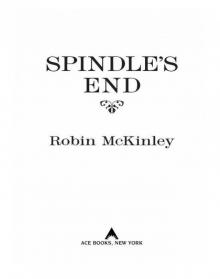 Spindle's End
Spindle's End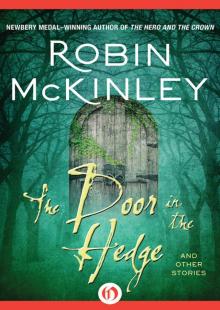 The Door in the Hedge: And Other Stories
The Door in the Hedge: And Other Stories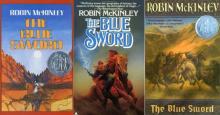 The Blue Sword
The Blue Sword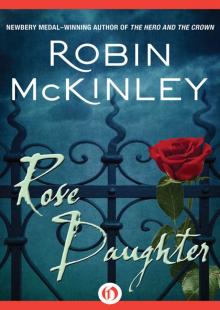 Rose Daughter
Rose Daughter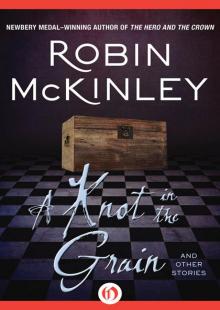 A Knot in the Grain and Other Stories
A Knot in the Grain and Other Stories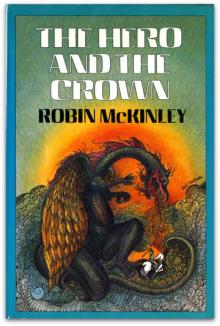 The Hero And The Crown
The Hero And The Crown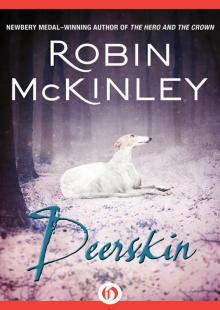 Deerskin
Deerskin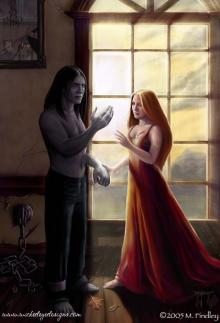 Sunshine
Sunshine Beauty: A Retelling of the Story of Beauty and the Beast
Beauty: A Retelling of the Story of Beauty and the Beast Shadows
Shadows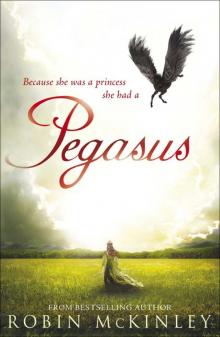 Pegasus
Pegasus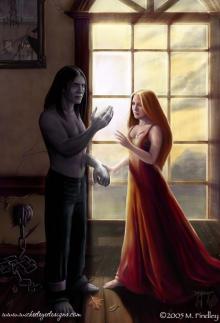 Chalice
Chalice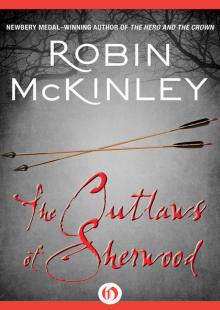 The Outlaws of Sherwood
The Outlaws of Sherwood Fire: Tales of Elemental Spirits
Fire: Tales of Elemental Spirits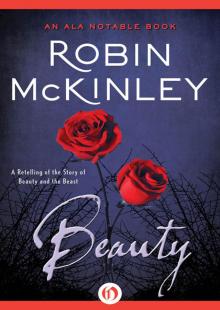 Beauty
Beauty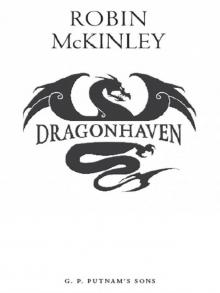 Dragon Haven
Dragon Haven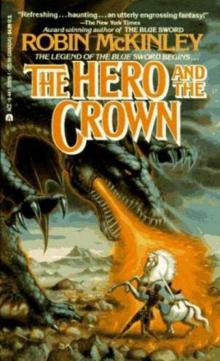 The Hero And The Crown d-2
The Hero And The Crown d-2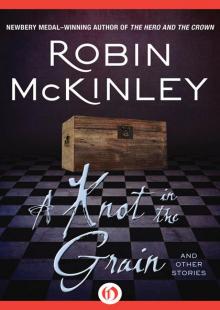 A Knot in the Grain
A Knot in the Grain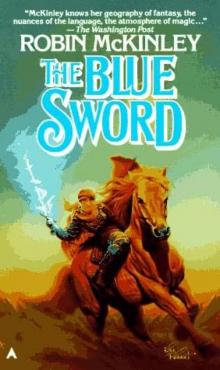 The Blue Sword d-1
The Blue Sword d-1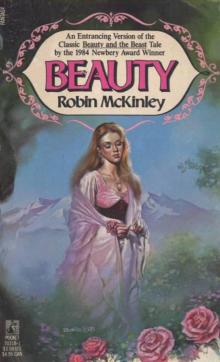 Beauty (v1.2)
Beauty (v1.2)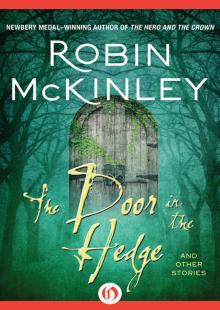 The Door in the Hedge
The Door in the Hedge